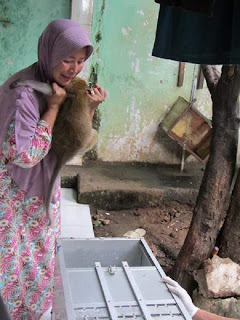 Our macaque and slow loris rescue centre in Ciapus was recently contacted by a member of the public, concerned about a long-tailed macaque she had seen chained up in a residential street in the Indonesian capital, Jakarta. Long-tailed macaques are a common household pet throughout Indonesia, and it isn’t unusual to see them kept in this way, particularly when they reach adulthood.
Our macaque and slow loris rescue centre in Ciapus was recently contacted by a member of the public, concerned about a long-tailed macaque she had seen chained up in a residential street in the Indonesian capital, Jakarta. Long-tailed macaques are a common household pet throughout Indonesia, and it isn’t unusual to see them kept in this way, particularly when they reach adulthood.Further discussions with this woman revealed that she was herself the owner of two long-tailed macaques. After our vets explained about our centre and the ethical issues and challenges of keeping primates in captivity, she agreed to hand them over to us. So last week the IAR team headed to Jakarta to rescue three macaques!
 The first macaque was an adult male that was being kept outside someone’s house, and was attached to a wooden bench by a chain around his waist. Although the owner insisted he often took the macaque for walks, the macaque looked agitated and was continually biting himself. The area was busy, and directly opposite a very noisy school, so it isn’t difficult to imagine how frightened he must have been. In these situations, IAR vets usually use a blow dart to anaesthetise macaques, but as a large number of local people, including children, had gathered round to watch, it was decided to try and sedate him by hand. The IAR vets assessed the situation and felt it was safe to do it by hand while using a net for protection. How local people interpret our actions is incredibly important to us, and we were worried how using a blow dart would look, particularly to school children! Once the macaque had been anaesthetised, he was transferred in to an IAR transport cage, and our vet Intan gave a presentation to the local residents about our project, why we were taking the macaque and our veterinary procedures. Leaflets were also handed out. The fact that a member of the public had alerted us to this macaque in the first place is a positive sign, and we hope our outreach activities continue these developments!
The first macaque was an adult male that was being kept outside someone’s house, and was attached to a wooden bench by a chain around his waist. Although the owner insisted he often took the macaque for walks, the macaque looked agitated and was continually biting himself. The area was busy, and directly opposite a very noisy school, so it isn’t difficult to imagine how frightened he must have been. In these situations, IAR vets usually use a blow dart to anaesthetise macaques, but as a large number of local people, including children, had gathered round to watch, it was decided to try and sedate him by hand. The IAR vets assessed the situation and felt it was safe to do it by hand while using a net for protection. How local people interpret our actions is incredibly important to us, and we were worried how using a blow dart would look, particularly to school children! Once the macaque had been anaesthetised, he was transferred in to an IAR transport cage, and our vet Intan gave a presentation to the local residents about our project, why we were taking the macaque and our veterinary procedures. Leaflets were also handed out. The fact that a member of the public had alerted us to this macaque in the first place is a positive sign, and we hope our outreach activities continue these developments! We then went to rescue the two macaques kept as pets. One of these macaques, a young female, was chained to a tree, while the other, a slightly older female, was kept in a cage. Although the conditions were completely inappropriate for macaques, in a busy residential area, just off a main road, and the macaque in the cage had obviously been plucking the hairs out of her legs, the owner clearly loved the animals, and she had a good relationship with them. Although she was upset to give them up, they will have a far better life at our centre, where they will be introduced to other macaques, begin the rehabilitation process and be assessed for possible future release back in to the wild.
We then went to rescue the two macaques kept as pets. One of these macaques, a young female, was chained to a tree, while the other, a slightly older female, was kept in a cage. Although the conditions were completely inappropriate for macaques, in a busy residential area, just off a main road, and the macaque in the cage had obviously been plucking the hairs out of her legs, the owner clearly loved the animals, and she had a good relationship with them. Although she was upset to give them up, they will have a far better life at our centre, where they will be introduced to other macaques, begin the rehabilitation process and be assessed for possible future release back in to the wild.All three macaques are currently undergoing quarantine, and will be tested for any diseases in the coming days.

No comments:
Post a Comment